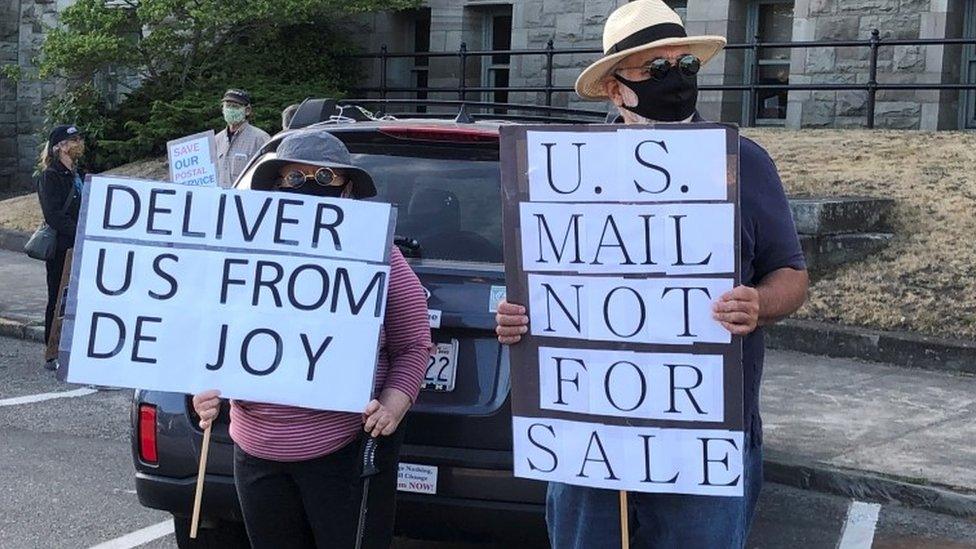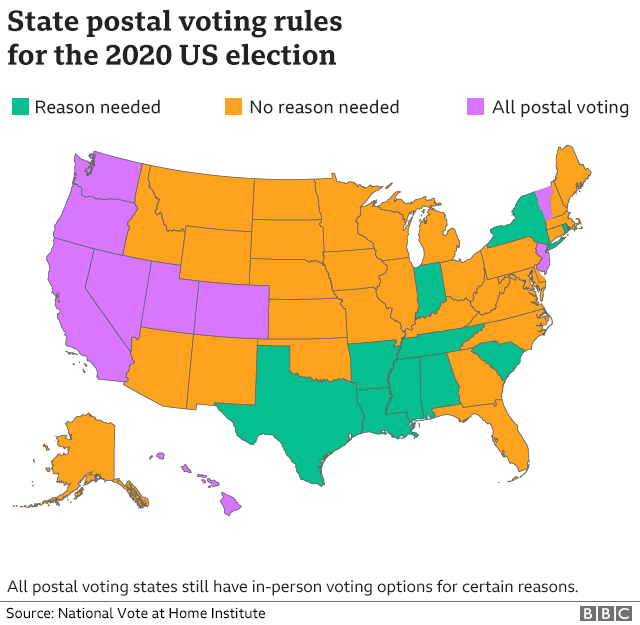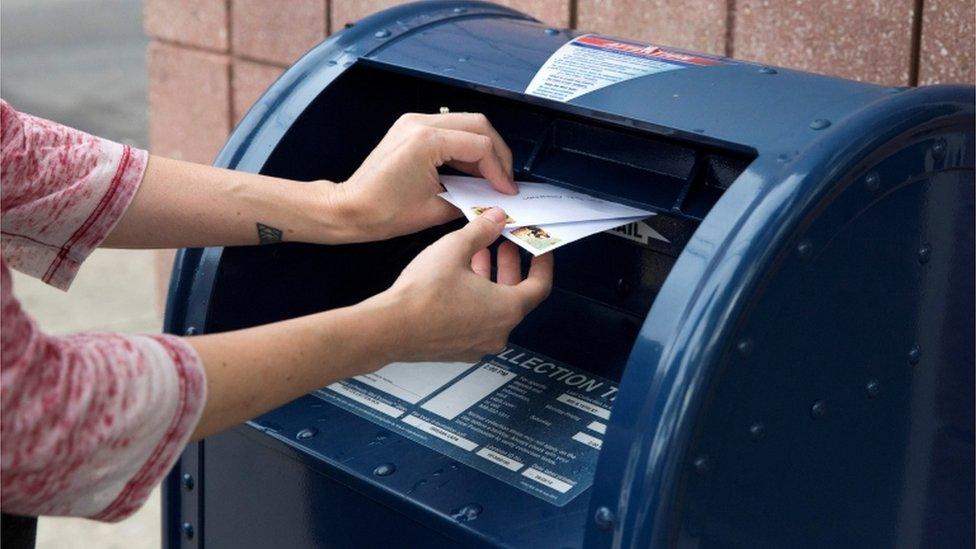US Postal Service: Democrats to press on with bill despite U-turn on cutbacks
- Published

The USPS is the most popular US government agency
Democrats are to press on with a bill to fund the US Postal Service, despite the postmaster's decision to suspend a controversial plan to cut it back.
Critics said the changes would have hampered postal voting, a key issue in November's presidential election.
Postmaster General Louis DeJoy, a key ally of President Trump, who believes postal votes will harm his re-election, halted the cuts until after the poll.
But leading Democrat Nancy Pelosi said the service was still at risk.
On Wednesday, she spoke with Mr DeJoy and after their conversation said his rowing back of changes was "wholly insufficient"., external
She and other Democrat leaders are pushing for $25bn (£19bn) in extra funding for the postal service ahead of the November election. The House of Representatives is expected to vote on the legislation on Saturday, with lawmakers rushed back from summer recess.
A surge in postal ballots is expected in the election, amid the coronavirus outbreak. But President Trump strongly opposes them, saying they would lead to widespread voter fraud, although there is no evidence this would happen.
What changes had been planned?
The US Postal Service (USPS) has been under financial pressure, which will only increase with the postal-voting burden. Up to half of all votes could be postal ballots.
Under Mr DeJoy it had begun what it said were cost-cutting measures. These included removing mail boxes, cancelling delivery runs, reducing overtime and closing down sorting centres.
But opponents said this would slow down the handling of postal ballots.


Referring to postal ballots, Mr Trump said on Tuesday the election might "never come out with an outcome" and "they'll have to do it again, and nobody wants that".
The row has sparked allegations that the USPS, the most popular government agency, is being politicised.
On Wednesday, White House Press Secretary Kayleigh McEnany said the White House was open to extra funding of the post office but wanted any legislation to include further economic stimulus measures.
"We are certainly open to looking at the $25bn [proposed by Democrats], but we want included in there relief for the American people that thus far speaker Pelosi has been entirely uninterested in," she said.
Earlier this month President Trump signed executive orders to provide economic aid, after talks in Congress over a new stimulus package broke down.
Ms McEnany also would not confirm to reporters that Mr Trump would accept November's election results if he did not win.
What have the Democrats said?
Ms Pelosi, the speaker of the Democrat-run House of Representatives, said it still planned to vote on the Postal Service bill to boost funding and halt organisational changes.
She said Mr DeJoy's suspension "only halts a limited number of the postmaster's changes, does not reverse damage already done, and alone is not enough to ensure voters will not be disenfranchised by the president this fall".
"The House will be moving ahead with our vote this Saturday," she added.
Earlier she said Mr DeJoy had "felt the heat... and that's what we were trying to do, make it too hot for them to handle".
Democrat House majority leader Steny Hoyer said his party was "going to make sure in law" that the changes would be stopped.
If, as expected, the bill passes in the House of Representatives, it will go to the Republican-run Senate.
Some Republicans have also opposed the proposed USPS changes but Senate majority leader Mitch McConnell said: "I don't think we'll pass, in the Senate, a postal-only bill."
What did Mr DeJoy say?
The former Republican donor said that post office hours would not now be cut, and post boxes and sorting machines would stop being removed.
He also said overtime pay would continue to be approved to ensure deliveries arrived on time.
"To avoid even the appearance of any impact on election mail, I am suspending these initiatives until after the election is concluded," Mr DeJoy said in a statement.
The U-turn came with Mr DeJoy due to testify to Congress and at least 20 states preparing to sue.
Mr Trump said he was not involved in the decision and White House Chief of Staff Mark Meadows said the president had never ordered postal operational changes to slow mail deliveries.
Postal voting in the US
Voting by mail is not new to the US. According to Reuters, approximately one in every four voters cast ballots by mail in 2016.
Critics say people could vote more than once via absentee ballots and then again in person, though numerous nationwide and state-level studies over the years have found no evidence of widespread fraud.
The rate of voting fraud overall in the US is between 0.00004% and 0.0009%, according to a 2017 study by the Brennan Center for Justice, external.
You might be interested in watching:
Why Alexis and Amira could help decide the US election
- Published17 August 2020
